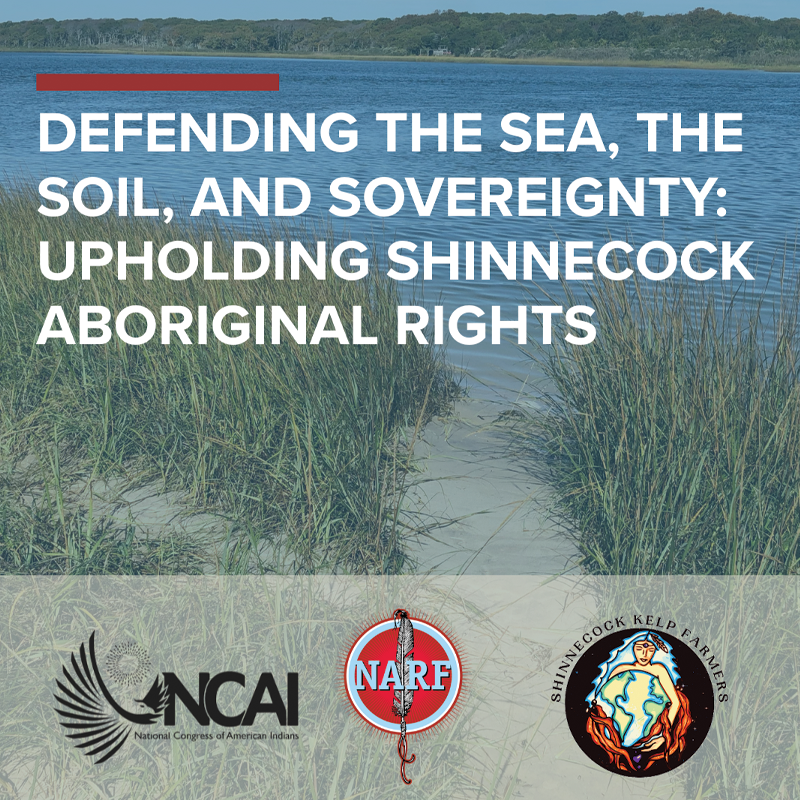Shinnecock Tribal citizens are asserting aboriginal fishing rights in court, seeking a decision that would confirm their right to continue their ancestral fishing practices in Shinnecock Bay in Long Island, New York. In support, several Tribal organizations and others filed amici curiae briefs in Silva v. Farrish, a case in the United States District Court for the Eastern District of New York, explaining the importance and legal underpinnings of the fishers’ aboriginal rights claims. The National Congress of American Indians and Shinnecock Kelp Farmers, and the United Southern and Eastern Tribes Sovereignty Protection Fund (USET SPF) filed amicus briefs on May 15, 2025.

In the case, the Tribal fishers and amicus parties assert that the Shinnecock Nation has never relinquished its aboriginal fishing rights, nor has the United States ever expressly terminated its aboriginal fishing rights. Because those rights have not been lost, the parties argue Shinnecock Tribal citizens have legal rights to fish that the State of New York must honor. Practically, this means that New York must engage the Tribal Nation in the collaborative regulation and management of the fishery.
“The case is about affirming the continued existence of aboriginal Shinnecock fishing rights that have never been ceded away or extinguished in any manner. For thousands of years, the Shinnecock have routinely fished in the waters around Long Island for their sustenance, economic livelihood, and cultural and religious practices. My clients seek to continue exercising their ancestral fishing rights and carry forward Shinnecock traditional ways,” said Riley Plumer, counsel for the Shinnecock Tribal fishers in the case.
“NCAI has fought for the restoration of Tribal fisheries and the honoring of Tribal fishing rights since the 1950s,” said NCAI President Mark Macarro. “We join the Shinnecock Indian Nation and its citizens in this case in asserting that their aboriginal fishing rights continue to exist and must be upheld. For centuries Shinnecock citizens have fished these waters as a rightful lifeway, not a hobby. When states ignore that living history and criminalize traditional harvest, they violate the very principles of Tribal sovereignty on which this Nation was founded. The court now has the opportunity to affirm what Tribal Nations, federal precedent, and basic justice already recognize: Shinnecock waters are Shinnecock waters.”
The NCAI-Shinnecock Kelp Farmers amicus brief stated: “Tribal Nations have collaboratively managed fisheries with state, federal, and other Tribal governments across the United States for decades, and Tribal governments devote significant resources to protect and restore fisheries and habitat.”
“The Shinnecock Indian Nation is an inherently sovereign government that predates the arrival of colonizing forces, and Shinnecock’s aboriginal fishing rights flow from this inherent sovereignty. Federal Indian law says Shinnecock retains these rights until clearly abrogated by Congress or legally relinquished by the Tribal Nation. USET SPF is proud to stand in support of Shinnecock and its citizens in calling on New York to recognize these inherent rights,” said Kirk Francis, President of USET SPF and Chief of the Penobscot Nation.
The Shinnecock Kelp Farmers are a group of Shinnecock women that grow sugar kelp, a sustainable means to reduce nitrogen and other pollutant imbalances that run off Long Island into Shinnecock Bay. The women work to regain healthy fisheries and rebuild ecosystems one plant at a time. “We have a right to fish, to gather, to hunt, and we never ceded or gave away those rights,” said Shinnecock Kelp Farmer Tela Troge.
The Shinnecock have stewarded, farmed, and fished the Shinnecock Bay, the Peconic Estuary, and the Atlantic Ocean since time immemorial. Shinnecock Tribal citizens still depend on and manage freshwater and saltwater aquatic resources in and near Shinnecock Bay. The Shinnecock’s ancestral territory is rich in kelp, oysters, scallops, and clams, but these resources are struggling to survive pollution and disruptions that threaten water quality levels. Yet, the New York Department of Environmental Conversation refuses to acknowledge the Shinnecock’s aboriginal fishing rights or work collaboratively with the Nation to protect shared resources.
Riley Plumer, Plumer Law Office, represents the Shinnecock Tribal fishers. Daniel Cordalis and Ashley Anderson of the Native American Rights Fund represent NCAI and the Shinnecock Kelp Farmers, and Katie Klass represents USET SPF as General Counsel.
For more information about work to protect aboriginal fishing rights, visit: https://narf.org/category/hunting-fishing-rights/.
More blog posts

